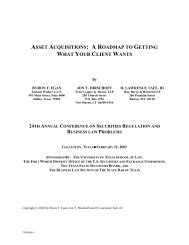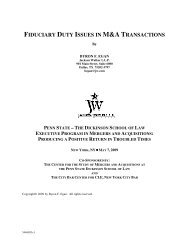Early Termination and Liquidation Provisions in Energy Trading and ...
Early Termination and Liquidation Provisions in Energy Trading and ...
Early Termination and Liquidation Provisions in Energy Trading and ...
You also want an ePaper? Increase the reach of your titles
YUMPU automatically turns print PDFs into web optimized ePapers that Google loves.
Proponents of two-way payment assert that: (i) a party’s breach pursuant to an event of default should notresult <strong>in</strong> that party’s loss of the benefit of the barga<strong>in</strong> so long as the non-default<strong>in</strong>g party is kept whole; (ii)two-way payment is more equitable; (iii) a party cannot manage the risk that it might lose the value of its <strong>in</strong>the-moneyforward positions upon the occurrence of an event of default; <strong>and</strong> (iv) two-way damages are morelikely to be enforced with less delay, expense <strong>and</strong> <strong>in</strong>convenience than are one-way damages. Although atleast one court has found that one-way payments are enforceable under certa<strong>in</strong> circumstances, 42 this approachis generally not recognized <strong>and</strong> most energy trad<strong>in</strong>g <strong>and</strong> market<strong>in</strong>g master agreements utilize two-waypayment. Reasons for this preference <strong>in</strong>clude the general legal pr<strong>in</strong>ciple that liquidated damages should notresult <strong>in</strong> a w<strong>in</strong>dfall for the non-breach<strong>in</strong>g party, 43 the fact that a non-default<strong>in</strong>g party is kept whole by twowaypayment, the concern that one-way payment is unenforceable due to its punitive rather thancompensatory nature, <strong>and</strong> the desire to avoid litigation that may arise if one-way payment is effected.E. Setoff1. In generalSetoff orig<strong>in</strong>ated as a common law remedy “grounded on the absurdity of mak<strong>in</strong>g A pay B when B owesA.” 44 Setoff is important “because, without an effective set-off clause, the Non-default<strong>in</strong>g Party might berequired to make payment to the Default<strong>in</strong>g Party . . . upon term<strong>in</strong>ation while, at the same time, the Nondefault<strong>in</strong>gParty may not have any realistic expectation of receiv<strong>in</strong>g payments owed to it by the Default<strong>in</strong>gParty (<strong>and</strong> its Affiliates) under other agreements.” 45 The most common form of setoff is the setoff ofobligations owed between parties under a s<strong>in</strong>gle agreement.Setoff can be a common law right, procedural right or contractual right. 46 Contractual setoff is usuallypreferred because it elim<strong>in</strong>ates the uncerta<strong>in</strong>ty of whether the necessary elements to use common law setoff orprocedural setoff have been met. In general, contractual setoff provisions are enforceable even if therequirements for common law setoff have not been met. 47Setoff is of great importance to the non-default<strong>in</strong>g party because, as to the obligations that are setoff: (i) itext<strong>in</strong>guishes the obligations without any further action of any type, <strong>in</strong>clud<strong>in</strong>g any action <strong>in</strong> any court or otherjudicial sett<strong>in</strong>g; (ii) it removes the non-default<strong>in</strong>g party’s credit risk for other amounts it is owed by thedefault<strong>in</strong>g party; (iii) it removes the market risk of positions mov<strong>in</strong>g <strong>in</strong> directions adverse to the nondefault<strong>in</strong>gparty before the non-default<strong>in</strong>g party receives payment; (iv) it removes the non-default<strong>in</strong>g party’scash flow risk while wait<strong>in</strong>g for payments; (v) it allows the non-default<strong>in</strong>g party to avoid entanglement <strong>in</strong>bankruptcy proceed<strong>in</strong>gs; <strong>and</strong> (vi) when the default<strong>in</strong>g party is bankrupt, it m<strong>in</strong>imizes any payment the nondefault<strong>in</strong>gparty must make to the <strong>in</strong>solvent counterparty who is unlikely to make any payment it owes to thenon-default<strong>in</strong>g party.2. Cross-product setoffIt is usually beneficial to the non-default<strong>in</strong>g party to setoff as many of its obligations to the default<strong>in</strong>g party aspossible. Cross-product setoff allows the non-default<strong>in</strong>g party to setoff obligations aris<strong>in</strong>g under differenttypes of energy agreements <strong>and</strong> to m<strong>in</strong>imize its payment obligations on a portfolio-wide, rather thanagreement-by-agreement, basis. 48In some cases cross-product setoff <strong>in</strong>volves sett<strong>in</strong>g off forward contracts aga<strong>in</strong>st swap agreements, whichm<strong>in</strong>imizes a f<strong>in</strong>al settlement payment follow<strong>in</strong>g a term<strong>in</strong>ation <strong>and</strong> liquidation. Further, this process serves as atool to aggregate exposure across all trad<strong>in</strong>g products with a counterparty to permit the flexible use of creditl<strong>in</strong>es across products <strong>and</strong> more efficiently utilize posted collateral. Although energy trad<strong>in</strong>g <strong>and</strong> market<strong>in</strong>gcompanies tend to treat forward contracts <strong>and</strong> swap contracts as opposite sides of the same co<strong>in</strong>, theBankruptcy Code discusses them <strong>in</strong> separate sections <strong>and</strong> does not discuss whether swaps <strong>and</strong> forwardcontracts may be setoff aga<strong>in</strong>st each other dur<strong>in</strong>g the existence of the automatic stay. 49 Likewise, no caseshave expressly ruled that this type of setoff is permissible. While a lead<strong>in</strong>g bankruptcy authority hasexpressed approval of this type of cross-product setoff, 50 <strong>and</strong> a bankruptcy reform bill pend<strong>in</strong>g <strong>in</strong> Congresswould expressly authorize it, 51 it is currently unclear whether this type of setoff may be effectuated dur<strong>in</strong>g an8
















